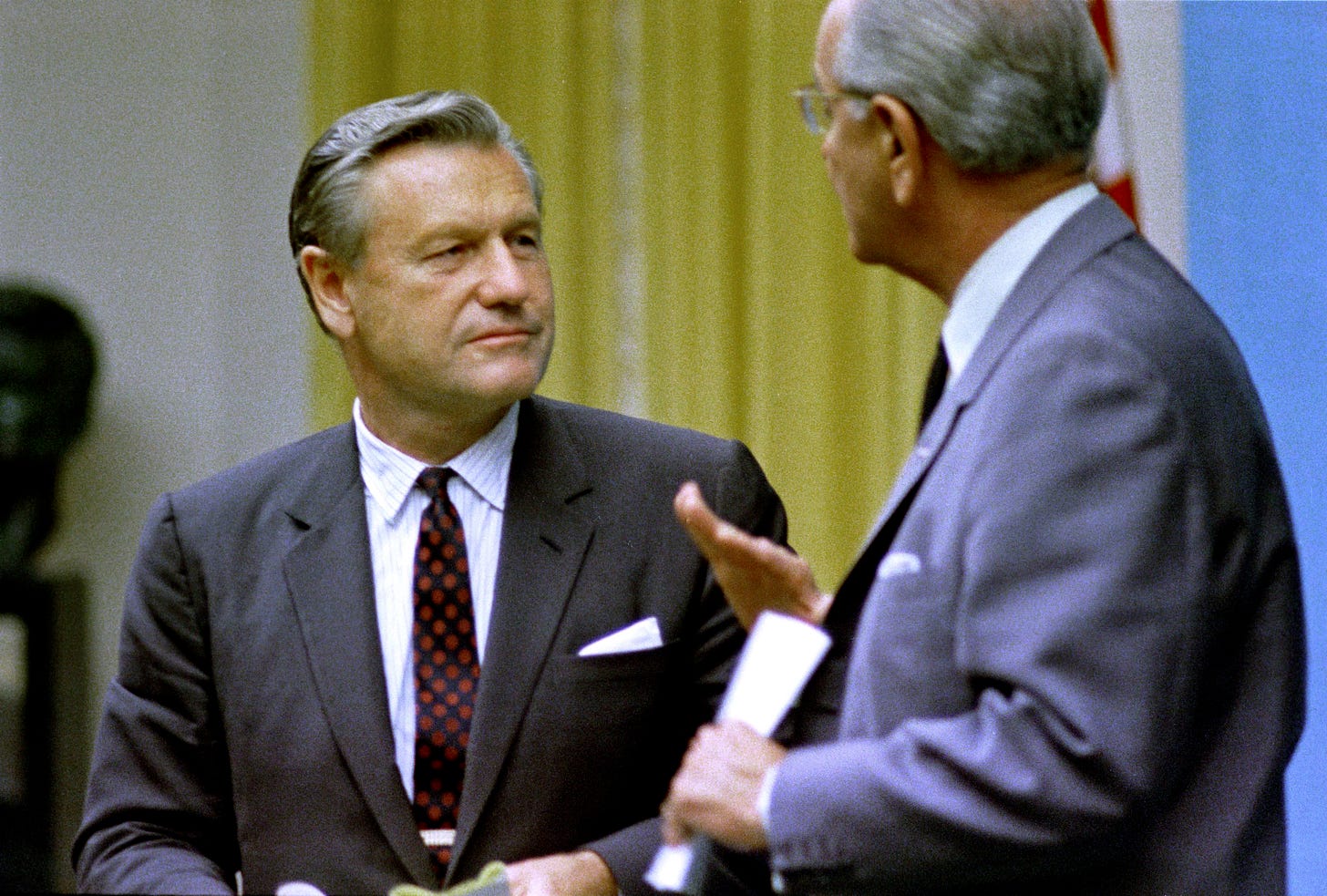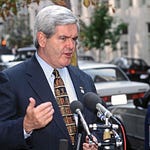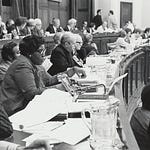Republican Nelson Rockefeller (left) with Democratic President Lyndon B. Johnson at the White House on June 10, 1968. Photo credit: Yoichi Okomoto/Lyndon Baines Johnson Library/Wikimedia Commons
Ana Navarro is probably best known for her work on the popular daytime talk show, The View. But she also has serious chops as a Republican political strategist. She served on Florida Governor Jeb Bush’s staff—you may recall that Bush was leveled by Donald J. Trump early in the 2016 Republican primary season—and, as co-chair of the GOP’s National Hispanic Advisory Council Navarro worked with establishment conservatives in her party like Arizona Senator John McCain and Utah Governor Jon Huntsman.
In other words, Navarro was the kind of Republican that no longer exists, a Reagan conservative in a party where extremists had been on the offensive for at least two decades. By 2016, people like Navarro were, depending on where you stood in the GOP, thought of moderates, squishes, or not Republicans at all.
After the Billy Bush tape, in which Trump unknowingly joked over an open mic about sexually assaulting women, Navarro became what we now call a “Never Trump” Republican. She declared that she would vote for Democrat Hillary Clinton, and when Trump won the election, she spoke out against his harsh anti-immigrant policies.
On August 27, 2017, a little over seven months into after Trump took office, Dana Bash, a co-host of CNN’s Sunday talk show, SOTU, invited Navarro to join the Democratic party. Another guest, Trump campaign advisor Michael Caputo, jeered that Navarro was already just a Democrat in disguise.
That’s right: those who oppose Donald Trump’s domination of the GOP are shown the door. Today, dozens of prominent Republicans have, at least temporarily, crossed party lines to endorse Democratic Vice President Kamala Harris in the 2024 election, even as they cling to their identities as conservatives.
But when did this polarization begin? Was it in 2016, when Trump obliterated his primary opponents and then defeated Clinton in one of the most divisive elections the United States had seen in 150 years? Was it earlier—1992, when populist Patrick J. Buchanan endorsed incumbent president George H.W. Bush at the Republican convention by urging the party to fight a culture war against immigrants, gays, and liberals? Or was it 1980, when Ronald Reagan was elected with the backing of the so-called New Right, an insurgent movement that that laid the tracks for Trump and pushed liberal Republicans—especially women—into the Democratic Party?
Yet there was a time when both parties had liberal and conservative factions. We probably shouldn’t call it a “golden age,” because although liberals reached across party lines to pass important civil rights legislation, especially in the 1960s, conservatives in both parties also fought those changes, eventually clustering in the GOP, where they remain today.
At least one politician argued against polarization, proposing that Republicans ought to simply ask whether a policy idea was good or bad, without characterizing its partisan quality. Here’s New York Governor Nelson Rockefeller, a scion of one of the wealthiest families in the United States at the time, being interviewed in 1961 by television newsman Max Goldberg about whether he thought of himself as liberal or conservative.
One way to think about Rockefeller’s politics is that he was a liberal Republican. Another way to characterize him is as moderate: a conservative, but one who was open to liberal ideas that, after 1980, were systematically stamped out in the GOP. Rockefeller remains hard to classify today, as historian Marsha Barrett points out in Nelson Rockefeller’s Dilemma: The Fight to Save Moderate Republicanism (Cornell University Press, 2024). For example, his draconian anti-drug policies in New York State became a template for similarly harsh laws around the country. These so-called “Rockefeller laws” devastated poor Black communities through incarceration and brutal policing, even as the international drug trade boomed.
At the same time, as Governor of New York, Rockefeller promoted the public good, pumping money into public higher education, medical care, and the arts. And significantly, as the Republican Party spun ever rightward after 1964, Rockefeller learned that the office he craved, President of the United States, would forever be out of reach.
Show notes:
Rockefeller’s disapproval of Governor Orville Faubus referenced the Arkansas segregationist’s 1958 decision to shut down the Little Rock public schools rather than bow to the Supreme Court’s order to desegregate.
Listeners who are interested in the Rockefeller family may wish to read Peter J. Johnson and John Ensor Harr, The Rockefeller Century: Three Generations of America's Greatest Family (Scribners, 1988).
To understand moderate Republicanism in the long history of the party, listeners may wish to read Heather Cox Richardson, To Make Men Free: A History of the Republican Party (Basic Books, 2021).
Marsha addresses the shift of Black voters from the Republican to the Democratic Party, beginning in the New Deal: Nancy Weiss Malkiel delves into this shift in Farewell to the Party of Lincoln: Black Politics in the Age of FDR (Princeton University Press, 1983).
Claire and Marsha discuss 1964 as a turning point where Black conservatives are increasingly fighting a rearguard action to protect a civil rights agenda in the GOP. Listeners may be interested in Leah Wright Rigueur’s deep dive into this transformative moment, The Loneliness of the Black Republican: Pragmatic Politics and the Pursuit of Power (Princeton University Press, 2015).
Marsha and Claire also discuss how the Democratic Party was changing, as Rockefeller’s moderation became more marginal in the GOP: feminism and racial equality were changing the party, but so were suburban voters, a key constituency for moderate Republicanism: see Lily Geismer, Don't Blame Us: Suburban Liberals and the Transformation of the Democratic Party (Princeton University Press, 2014).
Listeners interested in the Rockefeller Laws and the turn to incarceration as a critical phase in the 20th century war on drugs may wish to read my review essay, “The Suburbs Made the War on Drugs in Their Own Image,” The New Republic, February 27, 2024.
Claire and Marsha discuss the Attica prison uprising as a turn away from moderation for Rockefeller: for a terrific history of this moment, see Heather Ann Thompson, Blood in the Water: The Attica Prison Uprising of 1971 and Its Legacy (Pantheon, 2016).
You can download this podcast here or subscribe for free on Apple iTunes, Spotify, Google Podcasts, or Soundcloud. You can also keep up with Political Junkie content and watch me indulge my slightly perverse sense of humor on X, Instagram, Threads, YouTube, and TikTok.
If you enjoyed this episode, why not try:
Episode 55: The Ten-Dollar Founding Father: Chatting with historian William Hogeland about Alexander Hamilton, debt, taxes, visionaries, and his new book, "The Hamilton Scheme: An Epic Tale of Money and Power in the American Founding.”
Episode 48, “The Bright Sunshine of Human Rights: A conversation with journalist and historian James Traub about liberalism and his book, "True Believer: Hubert Humphrey's Quest for A More Just America."
Episode 20, Extremism in Defense of Liberty Is No Vice: A conversation with historian Matthew Dallek about his book, "Birchers: How the John Birch Society Radicalized the American Right."
And here’s a bonus: all new annual paid subscriptions include a free copy of my book about political media, Political Junkies: From Talk Radio to Twitter, How Alternative Media Hooked Us on Politics and Broke Our Democracy (Basic Books, 2020.)













Share this post